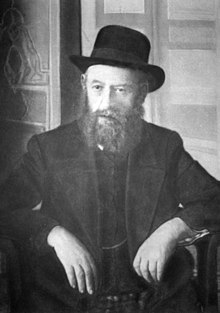Sholom Dovber Schneersohn
| Sholom Dovber Schneersohn | |
|---|---|
| Lubavitcher Rebbe | |

The Rebbe Nishmoso Eden
|
|
| Term | 10 September 1892 OS – 21 March 1920 NS |
| Full name | Sholom Dovber Schneersohn |
| Main work | Yom Tov Shel Rosh Hashana, 5666, Sefer HaMaamarim, 5672 |
| Born | 24 October 1860 OS Lyubavichi |
| Died | 21 March 1920 NS Rostov-on-Don |
| Dynasty | Chabad Lubavitch |
| Predecessor | Shmuel Schneersohn |
| Successor | Yosef Yitzchak Schneersohn |
| Father | Shmuel Schneersohn |
| Mother | Rivkah (granddaughter of Dovber Schneuri) |
| Wife | Sterna Sarah (daughter of Yosef Yitzchok of Ovruch) |
| Children | Yosef Yitzchok Schneersohn |
Sholom Dovber Schneersohn (Hebrew: שלום דובער שניאורסאהן) was an Orthodox rabbi and the fifth Rebbe (spiritual leader) of the Chabad Lubavitch chasidic movement. He is also known as "the Rebbe nishmosei eiden" (whose soul is in Eden) and as "the Rebbe Rashab" (for Reb Sholom Ber).
His teachings represent the emergence of an emphasis on outreach that later Chabad Rebbes would develop into a major theme.
He was born in Lubavitch, on 20 Cheshvan 1860, the second son of Shmuel Schneersohn, the fourth Chabad Rebbe. In 1882, when his father died, he was not quite 22 years old, and his brother Zalman Aharon was not much older. A period followed, during which both brothers fulfilled some of the tasks of a rebbe, but neither felt ready to take on the title and responsibilities. Over this period he gradually took on more responsibilities, particularly in dealing with the impact of the May Laws, and on Rosh Hashanah 5643 (10 September 1892 OS) he accepted the leadership of the Lubavitch movement.
He married his cousin, Rebbetzin Shterna Sara Schneersohn. She was the daughter of Yosef Yitzchok Schneersohn of Avorutch, a son of the Tzemach Tzedek. They had one son whom they named Yosef Yitzchok after Rebbetzin Shterna Sara's father. Yosef Yitzchok would later succeed his father as Rebbe.
In his early 40s he suffered a loss of sensation in his left hand, and in 1903 he spent two months in Vienna, where Sigmund Freud treated him with electrotherapy and Wilhelm Stekel treated him with the talking cure. The treatment had some success, restoring some feeling to the hand, but he was unable to stay in Vienna longer than two months. When he returned home he attempted to continue his treatment with a small machine that he had bought in Vienna, but experienced no further improvement and eventually gave up.
...
Wikipedia
